Forschung
Das DeVOTE Forschungsprojekt hat sowohl wissenschaftliche als auch praktische Relevanz.
Wissenschaftlich gesehen gibt DeVOTE eine neue Forschungsrichtung vor, die die verschiedenen Bedeutungen, die Bürger*innen mit wählen verbinden (oder nicht verbinden), erfasst, kategorisiert und ihre systemische Variation untersucht. Auf dieser Grundlage trägt die Forschung zum öffentlichen Verständnis von Wahlen bei. Damit werden völlig neue Erkenntnisse über die Auffassungen der Bürger*innen erbracht, die langjährige Schlussfolgerungen in Frage stellen. Dies in den Bereichen der politischen Partizipation und des Wahlverhaltens, der politischen Psychologie bezogen auf das politische Verständnis und die Kompetenz der Bürger*innen und der politischen Kommunikation bezogen auf den strukturellen Einfluss der Wahlberichterstattung auf die Ansichten von Bürger*innen.
Das Projekt hat auch praktische Auswirkungen darauf, wie Wahlen durchgeführt und verwaltet werden. Erstens, weil DeVOTE die Zusammenhänge zwischen den verschiedenen Bedeutungen der Stimmabgabe, und den Wahlvorstellungen und den Präferenzen für Wahlreformen der Bürger*innen untersucht. Zweitens, weil die breite geografische Reichweite des Projekts DeVOTE - die sowohl konsolidierte als auch nicht konsolidierte Demokratien umfasst-, einen beispiellosen Einblick in die legitimierenden Eigenschaften von Wahlen bietet und auch untersucht, unter welchen Bedingungen die Bürger*innen Wahlentscheidungen als sinnvoll wahrnehmen. Drittens haben die während des Projekts gesammelten Daten eine einzigartige politische Bedeutung, da diese Informationen über die Bedeutung von Wahlen für Bürger*innen liefern, die weiters als Grundlage genutzt werden können, um die von Medien und Politiker*innen konstruierten Interpretationen von Wahlen zu verfeinern und gegebenenfalls anzuzweifeln.
Um diese Forschungsziele zu verwirklichen, innoviert DeVOTE sowohl bei der Datenerhebung- durch die Kombination einer Citizen Science Webseite mit Paneldaten und experimentellen Studien -, als auch bei der Datenanalyse- durch die Kombination einer induktiven Kategorienbildung der Wahlbedeutungen und eines deduktiven Hypothesentests.
Im Folgenden erfahren Sie mehr über die Ziele des Projekts und können die Arbeitspakete und weitere Forschungsaktivitäten kennenlernen.
Ziel des DeVOTE Projektes ist es, erstmalig Erkenntnisse darüber zu liefern, was die Stimmabgabe für Bürger*innen bedeutet und wie diese Bedeutungen zwischen unterschiedlichen Individuen und verschiedenen Typen von Demokratien variieren.
Das DeVOTE-Team hat in den vergangenen Jahren mehrere Datenerhebungen durchgeführt. Seit Beginn des Projekts im Jahr 2021 wurden in 13 Ländern Daten von etwa 25.000 Personen erhoben. Es wurden Länder in Europa, Afrika, Nord- und Südamerika und Ozeanien erfasst: Australien, Brasilien, Kolumbien, Estland, Ungarn, Italien, Kenia, Nigeria, Serbien, Schweden, Tunesien, Türkei und die Vereinigten Staaten von Amerika. Allein aus den offenen Antworten haben wir fast eine Million Worte über die Bedeutung von Wahlen gesammelt. Wir freuen uns ankündigen zu können, dass einige Publikationen in Arbeit sind. Sie werden die neuesten Veröffentlichungen hier finden. Unser Ziel ist es, Open Access zu veröffentlichen, sodass Sie leicht auf unsere Forschungsergebnisse zugreifen können.
Published
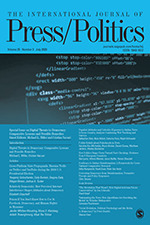 Negative Campaigns, Negative Votes? Meanings of Voting and Political Campaigns
Negative Campaigns, Negative Votes? Meanings of Voting and Political Campaigns
By Ming M. Boyer, Cal Le Gall, and Carolina Plescia, published in The International Journal of Press/Politics. https://doi.org/10.1177/19401612251376808
Paper won the 2022 ECPR Political Communication Division Best Paper Award
Increasing negative partisanship and affective polarization suggest that citizens may view voting more as opposing a candidate or party than supporting one – or even become averse to voting itself. Using preregistered analyses in Hungary and the U.S., we show that these negative meanings of voting are widespread and linked to electoral mobilization, democratic attitudes, and parties’ use of negative tactics. Two survey experiments confirm that campaign perceptions are mainly shaped by partisanship. While voting attitudes relate to campaign behavior, only the most extreme messages directly impact them, with subtler negative tactics influencing attitudes over time. The democratic implications are discussed.
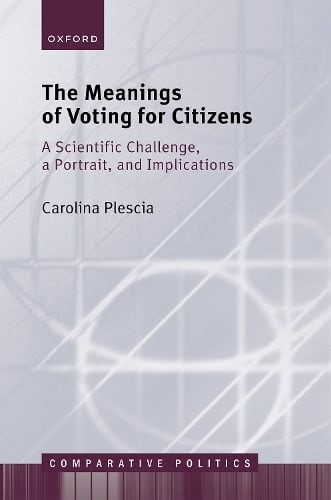 The Meanings of Voting for Citizens: A Scientific Challenge, a Portrait, and Implications
The Meanings of Voting for Citizens: A Scientific Challenge, a Portrait, and Implications
Oxford University Press https://doi.org/10.1093/9780198946335.001.0001
By Carolina Plescia
with M. Belén Abdala, André Blais, Ming M. Boyer, Anna Lia Brunetti, Cal Le Gall, Sylvia Kritzinger, Petro Tolochko, Markus Wagner and Elizabeth J. Zechmeister.
Carolina Plescia and colleagues explore the diverse conceptualizations of voting among citizens. This groundbreaking publication by the Oxford University Press, takes readers on a global journey to uncover how people across 13 countries in Europe, Africa, the Americas, and Oceania conceptualize the act of voting. This ambitious study draws on nearly a million words from over 25,000 individuals, collected through open-ended surveys and analysed using both qualitative and quantitative methods. The authors employ an innovative approach that combines conceptual, theoretical, and empirical insights to explore what voting means to citizens and how these meanings influence political engagement. Their findings challenge the assumption of universal views on democracy, revealing striking variations in how individuals perceive voting, both within liberal democracies and electoral autocracies.
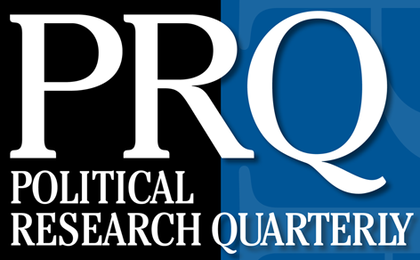 Trust in government or in technology? What really drives internet voting
Trust in government or in technology? What really drives internet voting
By M. Belén Abdala, Carolina Plescia, Ming M. Boyer, and Anna Lia Brunetti, published in Political Research Quarterly. https://doi.org/10.1177/10659129251321424
Internet voting is seen as a key technological innovation, with trust being crucial for its adoption. But which is more important: trust in government or in technology? Using a cross-sectional analysis and an online experiment in Estonia, we test a multidimensional trust framework. Our findings reveal a strong link between trust in government and i-voting technology, but trust in technology plays a stronger role in the choice between online and in-person voting. These insights enhance understanding of i-voting and its practical implementation in democratic processes.
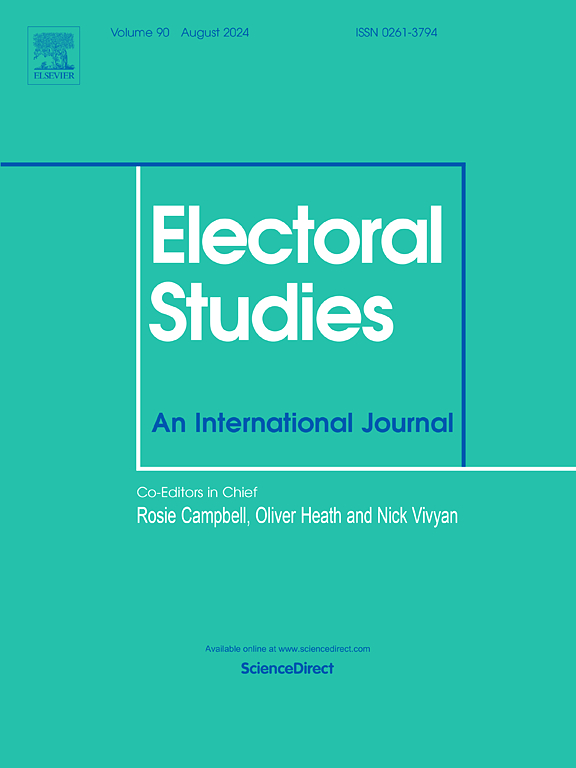 In-person or convenience voting? The role of the direct costs in explaining preferences for voting modalities
In-person or convenience voting? The role of the direct costs in explaining preferences for voting modalities
By M. Belén Abdala, published in Electoral Studies. https://doi.org/10.1016/j.electstud.2024.102851
High turnout is crucial for political legitimacy. By reducing the direct costs of voting in person, such as queuing and taking time off work, convenience voting modalities are expected to increase turnout. Yet, little is known about the role these costs play in explaining how citizens want to vote. This paper investigates whether perceptions of the direct costs of voting influence individual preferences for in-person compared to convenience forms of balloting such as voting by mail, or absentee voting. Using original cross-sectional data and a preregistered survey experiment encompassing the 2022 US midterm elections, I find that higher direct costs reduce individual preferences for in-person voting. Importantly, this reduction is not compensated by higher preferences for convenience modalities.
 Election Survey Data on Citizen Meanings of Voting in 13 Countries (SUF edition)
Election Survey Data on Citizen Meanings of Voting in 13 Countries (SUF edition)
By Carolina Plescia, M. Belén Abdala, Ming M. Boyer, Anna Lia Brunetti, Cal Le Gall, published by AUSSDA (2025, V1). https://doi.org/10.11587/1QQF9P
 Panel Election Survey Data on Citizen Meanings of Voting in Hungary and the USA (SUF edition)
Panel Election Survey Data on Citizen Meanings of Voting in Hungary and the USA (SUF edition)
By Carolina Plescia, M. Belén Abdala, Ming M. Boyer, Anna Lia Brunetti, Cal Le Gall, published by AUSSDA (2025, V1). https://doi.org/10.11587/UOWEY1
 2024 European Parliament Post-Election Survey in Six Countries (SUF edition)
2024 European Parliament Post-Election Survey in Six Countries (SUF edition)
By Clara Faulí Molas, Carolina Plescia, Diego Garzia, and Frederico Ferreira Da Silva, published by AUSSDA (2025, V1). https://doi.org/10.11587/BFCDJU
In press
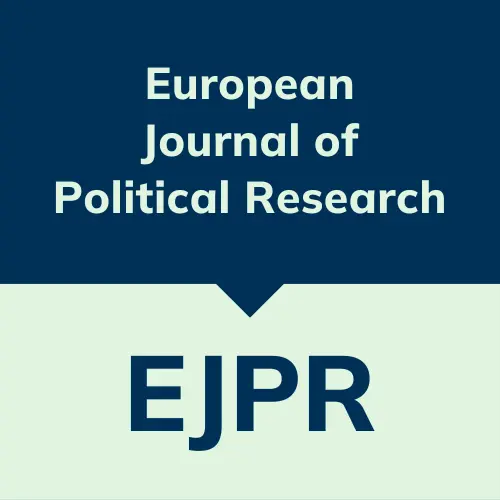 Voting Against or Against Voting?
Voting Against or Against Voting?
By Ming M. Boyer, Carolina Plescia, and André Blais, published in European Journal of Political Research.
Politics has grown more negative, sparking concerns about disengagement and democratic decline, but research offers conflicting results. We argue that this stems from a failure to distinguish between two types of negativity: (a) using voting to oppose a party, politician, or policy, and (b) rejecting voting itself. In a study of 12 diverse countries (N = 23,828), we validate these concepts, showing they reflect distinct attitudes. The first indicates dissatisfaction but belief in elections, while the second signals deeper disillusionment and rejection of voting. This distinction clarifies the link between political negativity and democracy.
Working papers
-
“Voting as if your rights depend on it: The role of strife in the political motivations of marginalized voters”
Abdala, M. Belén.
Currently under review
Research shows that gender, ethnicity, and sexuality influence voter turnout, but with mixed expectations. Some argue that marginalized groups face barriers that lower turnout, while others suggest that adversity motivates them to vote to defend their rights. This paper tests the latter by examining why women, LGB individuals, and ethnic minorities vote, focusing on two motivations: expressing preferences or seeking political change. Findings reveal that women report fewer motivations than men, while LGB individuals are more motivated instrumentally. Discrimination, especially for ethnic minorities, strengthens both motivations. These insights shed light on the psychological drivers of political participation in underrepresented groups.
-
“Meanings and action: are meanings of voting the heartbeat of political participation?”
Brunetti, Anna Lia.
Currently under review
The significance of voting is increasingly questioned as more citizens turn to alternative forms of civic engagement. This paper argues that citizens meanings of voting shape their political participation. Using survey data from eight countries, the findings show that these meanings not only affect voting but also other forms of participation, such as petitioning, protesting, or online activism. This underscores how meanings of voting drive political participation, acting as motivations or disincentives for engaging in specific political behaviors.
-
“Outgroup Vote Derogation: Making Sense of Outgroup Voting Behaviour”
Plescia, Carolina, Ming M. Boyer and M. Belén Abdala.
Currently under review
Partisans live in different areas, consume different sources of information, and often disagree on the very facts that they base their political opinions on. As a result, they are likely to misunderstand the political choices of opposing party supporters, including their votes. This paper introduces “outgroup vote derogation” to describe how partisans make sense of the voting behavior of opposing party supporters, and tests it in Brazil, Italy, and the USA, finding that it correlates with affective polarization and affects citizens’ satisfaction and acceptance of election outcomes, potentially threatening democratic stability.
-
“What does negative voting mean?”
Faulí Molas, Clara, Carolina Plescia, Diego Garzia, and Frederico Ferreira Da Silva.
Currently under review
This study examines the nature of negative voting by investigating whether it is driven primarily by expressive or instrumental considerations. The analysis uses as a case study the 2024 European Parliament elections conducted simultaneously across the EU. It uses originally collected post-election survey data from seven countries (Austria, Belgium, Germany, Hungary, Italy, the Netherlands, and Poland) and a new survey instrument. The results show that negative voting has a low prevalence and contains both instrumental and expressive components, but it is generally more instrumental than expressive compared to positive voting.
-
“In It to Win It? The Role of Citizen Meanings of Voting in the Winner-Loser Gap of Diffuse Political Support”
Boyer, Ming M., Anna Lia Brunetti, and Carolina Plescia.
In preparation for submission
Broad support of the political system is essential for democracy, but election winners and losers often differ in their diffuse political support. While institutional factors have been studied, less is known about how individual differences impact this gap. This paper explores how views on voting affect the winner-loser gap. Using panel data from Hungary and the US, findings show that those who see voting as instrumental amplify the gap, while those who vote out of ethical duty reduce it. Expressive voting has no effect, while voting to support democracy boosts support in both groups. These insights inform efforts to reduce the winner-loser gap and strengthen political support.
-
“Election integrity, electoral participation and the meanings of voting”
Abdala, M. Belén, and Anna Lia Brunetti.
Working paper
Doubts about election integrity can undermine democratic legitimacy and reduce voter turnout. This study challenges the assumption that all citizens vote to influence outcomes by examining how perceptions of election integrity – confidence in the fairness and conduct of elections – affect turnout. Using survey data from various countries holding elections between March 2022 and May 2023, we explore whether voting meanings (instrumental, expressive, ethical, allegiance, or anti-voting) explain this relationship. Our results show that high perceived integrity motivates non-voters and those with anti-voting meanings, while those with a meaning are discouraged from voting. This suggests the effect of perceived fairness on turnout varies across groups.
-
“Why do people run for office? Exploring the political motivations of first-time candidates”
Abdala, M. Belén and Carolina Plescia.
Working paper
Descriptively, office holders tend to represent a select few, often missing the broader diversity of the population. This raises a crucial question in the study of political representation: why do (some) individuals decide to run for office? While prior research has extensively examined political ambition and candidate emergence, most studies have focused on those already in the race or relied on hypothetical scenarios using convenient samples. To advance the discussion on what motivates people to run for office, we examine the political motivations of first-time candidates in the context of a real election campaign.
Das Projekt besteht aus vier Arbeitspaketen (english Work Packages/WPs):
WP1: Die Bedeutung der Stimmabgabe
Das DeVOTE-Projektteam stellt die Ergebnisse der Datenerhebung laufend über verschiedene Kanäle vor, z. B. auf Konferenzen, Workshops, in Blogbeiträgen, Nachrichtenartikeln und mehr. Um auf dem Laufenden zu bleiben, folgen Sie uns bitte auf Twitter und besuchen Sie unsere Website.


